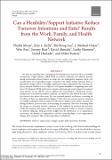| dc.contributor.author | Moen, Phyllis | |
| dc.contributor.author | Kelly, Erin L. | |
| dc.contributor.author | Lee, Shi-Rong | |
| dc.contributor.author | Oakes, J. Michael | |
| dc.contributor.author | Fan, Wen | |
| dc.contributor.author | Bray, Jeremy | |
| dc.contributor.author | Almeida, David | |
| dc.contributor.author | Hammer, Leslie | |
| dc.contributor.author | Hurtado, David | |
| dc.contributor.author | Buxton, Orfeu | |
| dc.date.accessioned | 2018-05-09T16:05:41Z | |
| dc.date.available | 2018-05-09T16:05:41Z | |
| dc.date.issued | 2016-12 | |
| dc.identifier.issn | 0037-7791 | |
| dc.identifier.issn | 1533-8533 | |
| dc.identifier.uri | http://hdl.handle.net/1721.1/115258 | |
| dc.description.abstract | We draw on panel data from a randomized field experiment to assess the effects of a flexibility/supervisor support initiative called STAR on turnover intentions and voluntary turnover among professional technical workers in a large firm. An unanticipated exogenous shock-the announcement of an impending merger-occurred in the middle of data collection. Both organizational changes reflect an emerging employment contract characterized by increasing employee temporal flexibility even as employers wield greater flexibility in reorganizing their workforces. We theorized STAR would reduce turnover intentions and actual turnover by making it more attractive to stay with the current employer. We found being in a STAR team (versus a usual practice team) lowered turnover intentions 12 months later and reduced the risk of voluntary turnover over almost three years. We also examined potential mechanisms accounting for the effects of these two organizational changes; STAR effects on reducing turnover intentions are partially mediated by reducing work-to-family conflict, family-to-work conflict, burnout, psychological distress, perceived stress, and increasing job satisfaction. The effect of learning about the merger on increasing turnover intentions is fully mediated by increased job insecurity. STAR also moderates the negative effects of learning about the merger on turnover intentions for different subgroups. Findings provide insights into the effectiveness of an organizational intervention, the dynamics of organizations, and how competing logics of two organizational changes affect employees' labor market expectations and behavior. | en_US |
| dc.publisher | Oxford University Press (OUP) | en_US |
| dc.relation.isversionof | http://dx.doi.org/10.1093/SOCPRO/SPW033 | en_US |
| dc.rights | Attribution 3.0 Unported (CC BY 3.0) | en_US |
| dc.rights.uri | https://creativecommons.org/licenses/by/3.0/ | en_US |
| dc.source | Oxford University Press | en_US |
| dc.title | Can a Flexibility/Support Initiative Reduce Turnover Intentions and Exits? Results from the Work, Family, and Health Network | en_US |
| dc.type | Article | en_US |
| dc.identifier.citation | Moen, Phyllis et al. “Can a Flexibility/Support Initiative Reduce Turnover Intentions and Exits? Results from the Work, Family, and Health Network.” Social Problems 64, 1 (December 2016): 53–85 © 2016 Oxford University Press | en_US |
| dc.contributor.department | Sloan School of Management | en_US |
| dc.contributor.mitauthor | Kelly, Erin L. | |
| dc.relation.journal | Social Problems | en_US |
| dc.eprint.version | Final published version | en_US |
| dc.type.uri | http://purl.org/eprint/type/JournalArticle | en_US |
| eprint.status | http://purl.org/eprint/status/PeerReviewed | en_US |
| dc.date.updated | 2018-03-02T17:13:35Z | |
| dspace.orderedauthors | Moen, Phyllis; Kelly, Erin L.; Lee, Shi-Rong; Oakes, J. Michael; Fan, Wen; Bray, Jeremy; Almeida, David; Hammer, Leslie; Hurtado, David; Buxton, Orfeu | en_US |
| dspace.embargo.terms | N | en_US |
| dc.identifier.orcid | https://orcid.org/0000-0003-2168-5611 | |
| mit.license | PUBLISHER_CC | en_US |
